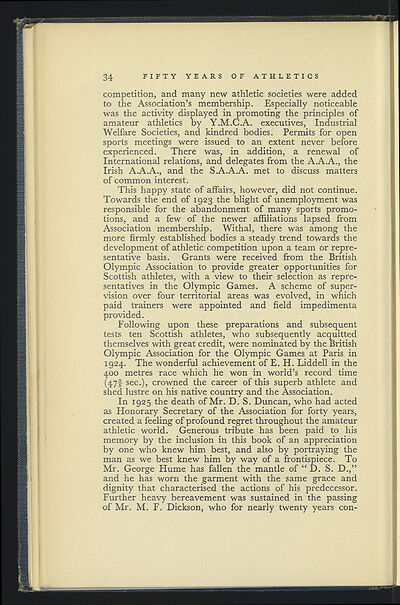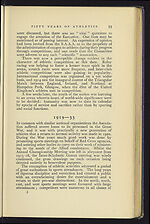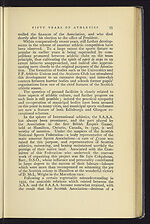Download files
Complete book:
Individual page:
Thumbnail gallery: Grid view | List view

34
FIFTY YEARS OF ATHLETICS
competition, and many new athletic societies were added
to the Association's membership. Especially noticeable
was the actiNity displayed in promoting the principles of
amateur athletics by Y.M.G.A. executives, Industrial
Welfare Societies, and kindred bodies. Permits for open
sports meetings were issued to an extent never before
experienced. There was, in addition, a renewal of
International relations, and delegates from the A.A.A., the
Irish A.A.A., and the S.A.A.A. met to discuss matters
of common interest.
This happy state of affairs, however, did not continue.
Towards the end of 1923 the blight of unemployment was
responsible for the abandonment of many sports promo-
tions, and a few of the newer affiliations lapsed from
Association membership. Withal, there was among the
more firmly established bodies a steady trend towards the
development of athletic competition upon a team or repre-
sentative basis. Grants were received from the British
Olympic Association to provide greater opport»nities for
Scottish athletes, with a view to their selection as repre-
sentatives in the Olympic Games. A scheme of super-
vision over four territorial areas was evolved, in which
paid trainers were appointed and field impedimenta
provided.
Following upon these preparations and subsequent
tests ten Scottish athletes, who subsequently acquitted
themselves with great credit, were nominated by the British
Olympic Association for the Olympic Games at Paris in
1
9
2
4. The wonderful achievement of E. H. Liddell in the
400
metres race which he won in world's record time
(473 sec.), crowned the career of this superb athlete and
shed lustre on his native country and the Association.
In
1925
the death of Mr. D. S. Duncan, who had acted
as Honorary Secretary of the Association for forty years,
created a feeling of profound regret throughout the amateur
athletic world. Generous tribute has been paid to his
memory by the inclusion in
this
book of an appreciation
by one who knew him best, and also by portraying the
man as we best knew him by way of a frontispiece. To
Mx. George Hume has fallen the mantle of " D. S. D.,"
and he has worn the garment with the same grace and
dignity that characterised the actions of his predecessor.
Further heavy bereavement was sustained in the passing
of Mr. XI. F. Dickson, who for nearly twenty years con-
FIFTY YEARS OF ATHLETICS
competition, and many new athletic societies were added
to the Association's membership. Especially noticeable
was the actiNity displayed in promoting the principles of
amateur athletics by Y.M.G.A. executives, Industrial
Welfare Societies, and kindred bodies. Permits for open
sports meetings were issued to an extent never before
experienced. There was, in addition, a renewal of
International relations, and delegates from the A.A.A., the
Irish A.A.A., and the S.A.A.A. met to discuss matters
of common interest.
This happy state of affairs, however, did not continue.
Towards the end of 1923 the blight of unemployment was
responsible for the abandonment of many sports promo-
tions, and a few of the newer affiliations lapsed from
Association membership. Withal, there was among the
more firmly established bodies a steady trend towards the
development of athletic competition upon a team or repre-
sentative basis. Grants were received from the British
Olympic Association to provide greater opport»nities for
Scottish athletes, with a view to their selection as repre-
sentatives in the Olympic Games. A scheme of super-
vision over four territorial areas was evolved, in which
paid trainers were appointed and field impedimenta
provided.
Following upon these preparations and subsequent
tests ten Scottish athletes, who subsequently acquitted
themselves with great credit, were nominated by the British
Olympic Association for the Olympic Games at Paris in
1
9
2
4. The wonderful achievement of E. H. Liddell in the
400
metres race which he won in world's record time
(473 sec.), crowned the career of this superb athlete and
shed lustre on his native country and the Association.
In
1925
the death of Mr. D. S. Duncan, who had acted
as Honorary Secretary of the Association for forty years,
created a feeling of profound regret throughout the amateur
athletic world. Generous tribute has been paid to his
memory by the inclusion in
this
book of an appreciation
by one who knew him best, and also by portraying the
man as we best knew him by way of a frontispiece. To
Mx. George Hume has fallen the mantle of " D. S. D.,"
and he has worn the garment with the same grace and
dignity that characterised the actions of his predecessor.
Further heavy bereavement was sustained in the passing
of Mr. XI. F. Dickson, who for nearly twenty years con-
Set display mode to:
![]() Universal Viewer |
Universal Viewer | ![]() Mirador |
Large image | Transcription
Mirador |
Large image | Transcription
Images and transcriptions on this page, including medium image downloads, may be used under the Creative Commons Attribution 4.0 International Licence unless otherwise stated. ![]()
| Sports publications > Fifty years of athletics > (44) |
|---|
| Permanent URL | https://digital.nls.uk/231656635 |
|---|
| Description | More than 230 sports publications from the National Library of Scotland's collections. Featured sports include football, rugby, golf, shinty, athletics, bowls, cricket and hockey. Among the material from the late 19th and early 20th centuries are match programmes, club histories, and handbooks. From the late 20th century are promotional materials to encourage greater diversity in sport. Most items cover sports activities in Scotland. There are also publications relating to the Olympics and international matches. |
|---|---|
| Additional NLS resources: |
|

